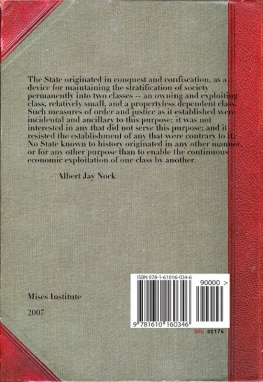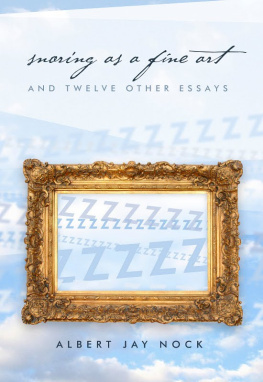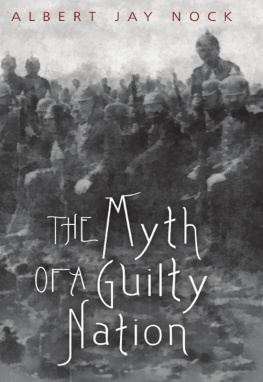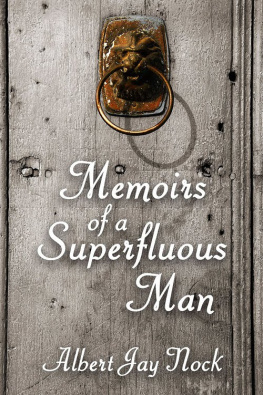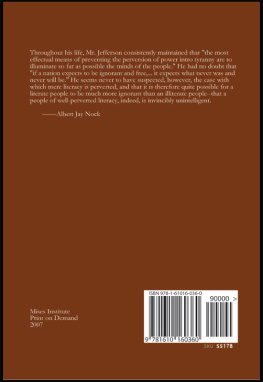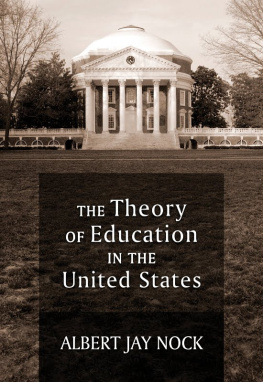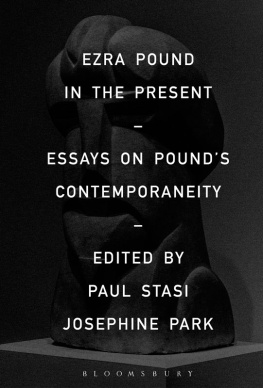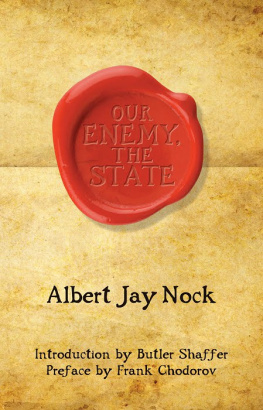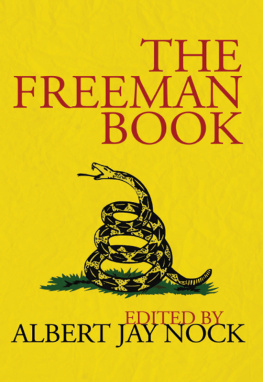On Doing the Right Thing
AND OTHER ESSATS

ON DOING THE RIGHT THING
AND OTHER ESSAYS
by
Albert Jay Nock

1928
HARPER & BROTHERS PUBLISHERS
New York and London


ON DOING THE RIGHT THING
COPYRIGHT, 1928, BY HARPER & BROTHERS
PRINTED IN THE U. S. A.
FIRST EDITION

L-C


To C. R. W.

CONTENTS



Preface
T HESE essays, except the first, were published in Harpers Magazine and The American Mercury within the last three years; the first one was printed as an introduction to a small volume, published in 1924 by A. and C. Boni, of selections from the writings of Artemus Ward. My best thanks are due Messrs. Boni and the editors of Harpers and the Mercury for permission to reprint them.
They bear on various aspects of the same subject, namely, the quality of civilization in the United States; and hence they have a certain unity, or a certain monotony, according as one is disposed to regard them. They are reprinted as they first appeared, without any changes worth speaking of. The exigencies of magazine publication, chiefly the haunting terror of a space limit, has had its effect upon their continuity and completeness, and to some extent upon their manner, as well. But a little imagination and benevolence will, I think, supply a sense of the integrity of critical purpose behind them.
ALBERT JAY NOCK.
Brussels, 27 March, 1928.
On Doing the Right Thing
Artemus Ward
C HARLES FARRAR BROWNE, known to the world as Artemus Ward, was born ninety years ago in Waterford, Maine. He died at an age when most of us are only beginning to maturethirty-three. Little more can be told of him by way of formal biography. Mr. Don C. Seitz lately employed himself upon a labour of love by seeking out and publishing all that is known, probably, of the externalities of Wards life. Mr. Seitz has made the most of what was put before him, and in so doing he has done good service to the history of American letters; yet one closes his fine volume with a keen sense of how little he had to do with, a sense of the slightness and insignificance of his material. All Wards years were Wander-jahre; he had no schooling, he left a poor rural home at sixteen to work in neighbouring printing-offices; he tramped West and South as a compositor and reporter; he wrote a little, lectured a little, gathered up odds and ends of his writings and dumped them in a woeful mess upon the desk of Carleton, the publisher, to be brought out in two or three slender volumes; he went to New York, then to London, saw as much of collective human life in those centres as he had energy to contemplate; he wrote a few pages for the old Vanity Fair and for Punch gave a few lectures in Dodworth Hall on Broadway and Egyptian Hall on Piccadilly; and then he died. Little enough of the pars magna fui is to be found here for the encouragement of a biographer; Mr. Seitz, I repeat, is to be congratulated on his intrepidity. It is surely a remarkable thing that one whose experience was limited by the span of thirty-three years, whose literary output was correspondingly scanty, and whose predicable hold upon the future was as slight and hazardous as Mr. Seitz shows Wards to have been, should have managed to live nearly a century; and it is perhaps more remarkable that he should have done it in a civilization like ours, which is not over-careful with literary reputations and indeed does not concern itself deeply with spiritual achievement or spiritual activity of any kind.
Yet that is what Artemus Ward has somehow managed to do, and Mr. Seitz is on hand with a bibliography of eighteen pages, closely printed in small type, to prove it. Some measure of proof, too, is probably to be found in the fact that a new issue of Wards complete works came out in London two years ago, and that an American firm has taken thought to publish this present volume. How, then, has Ward contrived to live so long? As a mere fun-maker, it is highly improbable that he could have done it. Ward is officially listed as the first of the great American humorists; Mr. Albert Payson Terhune even commemorates him as the man who taught Americans to laugh. This is great praise; and one gladly acknowledges that the humorists perform an immense public service and deserve the most handsome public recognition of its value. In the case of Ward, it is all to Mr. Terhunes credit that he perceives this. Yet as one reads Wards own writings, one is reminded that times processes of sifting and shaking-down are inexorable, and one is led to wonder whether, after all, in the quality of sheer humorist, Artemus Ward can quite account for his own persistent longevity. In point of the power sheerly to provoke laughter, the power sheerly to amuse, distract and entertain, one doubts that Ward can be said so far to transcend his predecessors, Shillaber and Derby. In point of wit and homely wisdom, of the insight and shrewdness which give substance and momentum to fun-making, it would seem that Wards contemporary, Henry W. Shaw, perfectly stands comparison with him. The disparity, at all events, is by no means so obvious as to enable one to say surely that the law of the survival of the fittest must take its course in Wards favour. One is therefore led to suspect either that Wards longevity is due to some quality which he possessed apart from his quality as humorist, some quality which has not yet, perhaps, been singled out and remarked with sufficient definiteness, or else that it is due to the blind play of chance.
Several considerations tell against the hypothesis of accident. It might be enough to say flatly that such accidents do not happen, that the passing stream of printed matter is too full and swift to permit any literary flotsam to escape being caught and swept on to oblivion by its searching current. Two other considerations, however, may be remarked as significant. First, that Ward very soon passed overalmost immediately passed over, the transition beginning even in the last few months of his lifepassed over from being a popular property to become a special property of the intelligent and civilized minority; and he has remained their special property ever since. In his quality of humorist he could hardly have done this. Even had he really been the man who taught Americans to laugh, disinterested gratitude could hardly be carried so far. Artemus Ward himself declined to weep over the memory of Cotton Mather, saying simply that hes bin ded too lengthy; and such, more or less, are we all, even the intelligent and civilized among us. Ward was, in his time, a popular property in virtue of his singularly engaging personality, his fine and delicate art as a public speaker and his brilliant dealing with questions and affairs of current interest. But his presence is no longer among us, and the affairs of profoundest public interest in his day are hardly as much as a memory in ours. No power of humour in dealing with those affairs could serve to continue him as a cherished property of the intelligent, any more than it could serve to restore him as a popular property now that those affairs, and the interest that they evoked, have disappeared. His continuance must be accounted for by another quality than those which he shared with his predecessors and contemporaries who have not taken on a like longevity.
Next page
